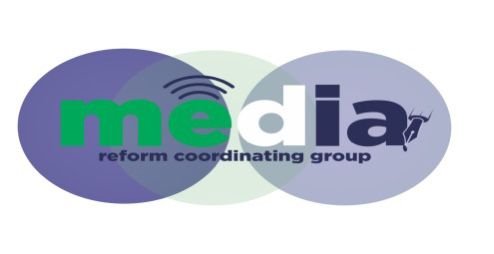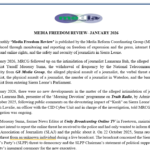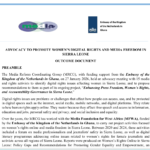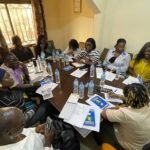By MRCG
The Media Reform Coordinating Group (MRCG), with support from European Union, through the BBC Media Action, has today 9 September 2025 concluded nationwide consultations with various stakeholders representing diverse groups on the review of the SLBC Act, 2010. The process, which started with regional consultations in Makeni for North and Northwest regions and in Bo for South and Eastern regions, brought together various regional and national stakeholders to look at the current Act and suggest possible changes for an independent public service broadcaster.
The MRCG is one of three local partners implementing the “Media Empowerment for Democracy, Inclusion and Accountability” (MEDIA) project, led by BBC Media Action and otherinternational consortium members.
The review process aligns with Recommendation 77 of the Cross-Party Committee on Electoral Systems and Management Bodies Review Report from July 2024, commonly known as the Tripartite Committee Report and Recommendation 4 in the National Action Plan (NAP) developed at the end of the National Media Viability and Investment Conference in April, 2022.
At today’s national consultation, MRCG’s National Coordinator, Dr. Francis Sowa, emphasized the significance of this initiative, noting that “this is not just about amending a piece of legislation; it is about laying the foundation for a stronger democracy, where the public broadcaster can serve all Sierra Leoneans without fear or favour.” He explained that the NAP recommendation 4 had urged the government to take concrete steps to promote public service and community media in Sierra Leone, adding that key sub-recommendation called for reviewing the governance and funding models of the SLBC to ensure greater independence, better infrastructure, improved content, and a sustainable long-term business plan.
The SLBC’s Board Chairperson, Dr. Williette PRO James, thanked the MRCG for leading the review process of the institution, highlighting key areas of reform for international best practices. She noted, among other things, that the reform process should particularly look at funding models for public service broadcasters and sustainability mechanisms for the SLBC.
The President of the Sierra Leone Association of Journalists (SLAJ), Alhaji Manika Kamara, called for the transformation of the SLBC into a truly independent public service broadcaster that serves the interest of all citizens, adding that reforming the national broadcaster is both a critical media reform issue and a democratic imperative. He stressed that SLAJ wants an SLBC that does not serve governments, political parties, or vested interests, but guarantees fair access, diverse voices, and quality programming that will strengthen democracy and promote national cohesion.
The Minister of Information and Civic Education, challenged stakeholders that if the SLBC should be a truly independent public service broadcaster, then all stakeholders must put their best in the review process. He added that those who drafted the current Act, did so with the best of intentions and they must be credited for what they believe was the best approach at the time of the enactment. He noted that amidst the challenges and the need for the review, there are dedicated staff who have diligently served the Corporation for years and that there have been some massive improvements over the years. He looked forward for a positive outcome document which would undergo steps to becoming a national law.
The outcome of this initiative include a series of consultative meetings with the SLBC Board and Management, Parliament, MDAs, and regional stakeholders which will culminate in a comprehensive report that will guide proposed amendments to the SLBC Act, marking a pivotal step towards media reform and democratic deepening in Sierra Leone.
The nationwide consultations generated valuable insights and recommendations from a wide range of voices, reflecting a national consensus on the future of public service broadcasting in the country.










Leave a Reply